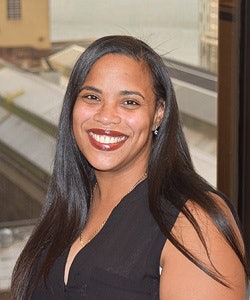With more than 46 million Americans living in poverty, the City University of New York (CUNY) has continued a nearly decade-long effort to holistically support student success through its Single Stop Program initiative.
 Shirley de Peña
Shirley de PeñaThe Single Stop program provides a central location for students and their families to receive confidential support around food resources, health insurance, legal and financial assistance and tax preparation assistance free of charge. Currently available in all seven of CUNY’s community colleges and at the John Jay College of Criminal Justice, the Single Stop initiative aims to alleviate non-academic “stressors” that can hinder students’ academic success and degree completion, leaders said.
“Academics are not the only thing that contributes to retention and gradation,” said Shirley de Peña, director of Youth Matter, a foster youth college success initiative within CUNY. If someone is struggling, “more tutoring is not always the answer” and if a student is hungry, “that student is not going to do well in school.”
CUNY established its partnership with the national Single Stop organization in 2009 to better connect students and their families to existing resources and benefits. Similarly, the institution’s program streamlines a network of food pantries, schools, criminal justice and health care centers, libraries and more to support students’ academic and social well-being.
Single Stop provides several confidential services at no cost:
· Benefit screening for Supplemental Nutrition Assistance Program (SNAP); Temporary Assistance for Needy Families (TANF); and Women, Infants and Children (WIC);
· Available food pantries
· Financial Counseling
· Legal Counseling
· Tax Assistance
· Health Care Enrollment
“These [benefits] are ones that can be difficult to tap into,” said de Peña, who is also a doctoral candidate in Social Welfare at Yeshiva University. She pointed out that benefits offices may have long lines or there might be waiting periods to even receive services.
A significant aspect of the program is that Single Stop helps to holistically support students’ success by extending service eligibility to their families.
“Improvements in family finance have been shown to keep families in their homes and put food on the table,” CUNY’s program website said. “This also helps their children stay healthy and do better in school. In fact, parental income is the number one predictor of college graduation.”
Further, the institution provides support services to faculty, staff and community members because “many of our colleges are right in the heart of different boroughs,” de Peña said.
Program counselors on-site at the eight CUNY colleges assess students’ – or students and immediate family members – benefit eligibility in a 15-minute interview session. This session produces information about the federal, state or local public benefits individuals are eligible to receive, including health insurance programs, nutrition programs, housing assistance, subsidies for childcare, energy assistance and tax credits.
Counselors then work with students throughout the application process to secure benefits or services. Between 2009 and 2017, Single Stop connected 107,569 families and individuals with $274,113,613 in benefits, tax refunds and support services.
The Single Stop program is staffed with “amazing and dedicated” directors and counselors, de Peña said, but it can still take them several sessions to get some students to open up about the support they need, she added.
“Many of our students depend on the Single Stop program and what they’re able to provide,” she said. “Many people are not comfortable just telling everyone ‘I have no money’ or ‘I have no food.’”
Each participating institution has at least one trained Single Stop counselor who is also an employee of the college. Counselors are embedded in the student services or financial aid office.
de Peña and the Office of Special Programs are working to expand faculty and staff-wide training opportunities that help them recognize when students are struggling.
“Some colleges might do this differently or more than others,” but across the CUNY system, information and trainings will include “what is being asked of staff,” de Peña said.
CUNY interim chancellor Dr. Vita C. Rabinowitz said Single Stop’s services around non-academic support will make it easier for students to focus on their studies. Students who want to learn more can visit Single Stop at CUNY.
Tiffany Pennamon can be reached at [email protected]. You can follow her on Twitter @tiffanypennamon.

![Mentor Mentee [60287]](https://img.diverseeducation.com/files/base/diverse/all/image/2024/04/Mentor_mentee__60287_.662959db8fddb.png?auto=format%2Ccompress&fit=crop&h=100&q=70&w=100)



















